#earthsea series
Text
Round 2 Part 4 Poll 4
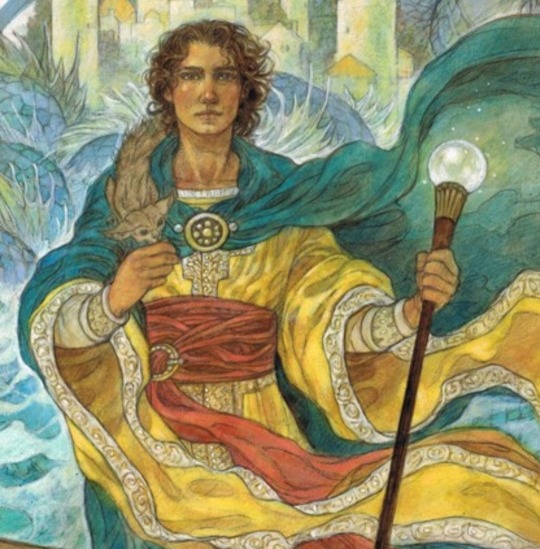

Propaganda
Ged's a wizard he's bisexual and he loves his boat so much. He's sailed around the world on his beloved little boat and learned everything about sailing even though he could've just used magic because it brought him joy. I just like him a lot. Also he talks to dragons
Jonny is an immortal (die and come back, regenerative immortality) pirate who commandeered the Aurora for himself and the woman who made him immortal. She proceeded to make several other people immortal, who all joined the crew, until they threw her out the airlock (several times. She left of her own free will as a result of this). Jonny declared that, as the original member, he was captain now. Everyone decided to ignore him. He introduces himself as ""your humble captain"" every performance, and every performance Tim (another crew member) and usually the entire audience yells "first mate!" He once said "so she came to the closest thing we have to a captain: myself" only for it to cut to the situation in question to show that he had no control at all. Even the starship doesn't see him as the captain (she's sentient. Also a lesbian! I love her). Captain struggles aside, he's so fun. He once committed every single crime on a planet (except the sex crimes). He had an arrest warrant out with the reason "just arrest the fucker". He has a whole post-patricide harmonica solo. He's fantastic
#battle of the captains#tournament polls#round 2#ged earthsea#sparrowhawk earthsea#earthsea series#a wizard of earthsea#earthsea cycle#earthsea#sparrowhawk#bookblr#ursula k le guin#ursula k. le guin#ursula le guin#jonny dville#jonny d'ville#the mechs#the mechanisms#songblr#bandblr#musicblr
284 notes
·
View notes
Text
Botanic Tournament : Plants' parts poll !
Kalász Hanna (Időfutár) - Hanna's (Hungarian) surname means ear (as in "the fruiting spike of a cereal including both the seeds and protective structures")
Myrrh / Adelaide (Arknights) - Myrrh is "a sap-like substance (resin) that comes out of cuts in the bark of trees that are members of the Commiphora species"
Ogion / Aihal (Earthsea) - "Ogion", his use-name, means "fir cone" in the fictional Hardic language
Utena Tenjou (Revolutionary Girl Utena) - here utena means calyx, "the outer cup portion of a flower which surrounds and protects the petals as they develop before the flower opens"
Sprig Plantar (Amphibia) - sprig : "a small stem bearing leaves or flowers, taken from a plant"
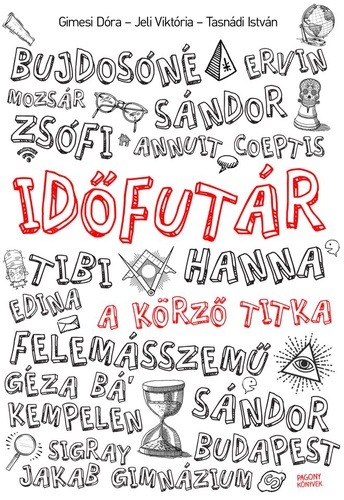
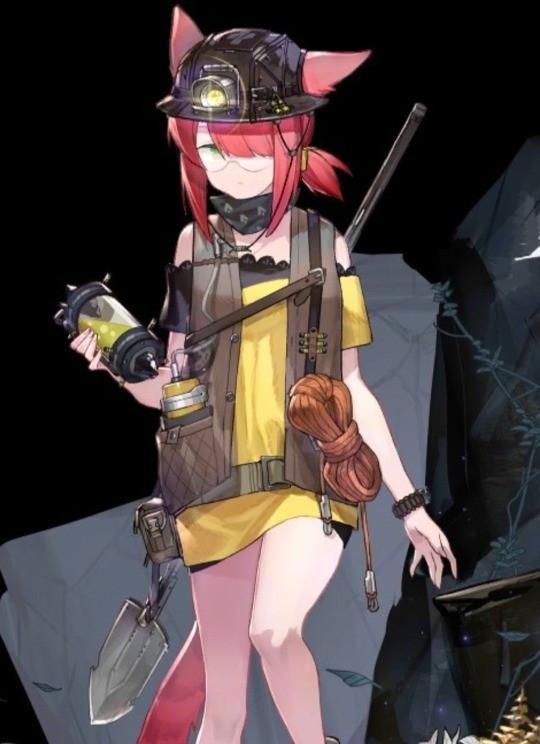
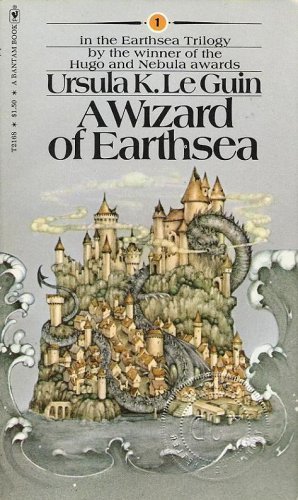


The two with the most votes will join the main bracket
#botanic tournament#tournament polls#plants parts poll#kalász hanna#időfutár#időfutár hanna#hanna időfutár#arknights#myrrh arknights#adelaide arknights#ogion earthsea#earthsea ogion#aihal earthsea#earthsea aihal#earthsea#a wizard of earthsea#earthsea series#ursula le guin#ursula k. le guin#revolutionary girl utena#shoujo kakumei utena#utena tenjou#tenjou utena#rgu#rgu utena#sprig plantar#amphibia#amphibia sprig#sprig amphibia
18 notes
·
View notes
Text
Was nobody going to tell me that the earthsea series was deeply ecofeminist? I thought it was just the whole male fantasy again repackaged. If I knew I would have read it already!
5 notes
·
View notes
Text
our body's working name is Irian (thank you Ursula Le Guin for the woman who is also a dragon) - and hilariously we only just realised that if we wanted to transition to male we could add t and then become Tirian (the last king of Narnia) - fortunately for our collective sanity we're all sufficiently at peace with the trans body we have cultivated together
6 notes
·
View notes
Text
S1 E09: A Wizard of Earthsea by Ursula K. Le Guin
Ted and Sarah discuss A Wizard of Earthsea by Ursula K. Le Guin. Discuss background on Le Guin, and the creation of Earthsea. We do discussion questions, book recommednations, likes, dislikes, and more!
#book#books & libraries#books and literature#booksbooksbooks#books#booktok#bookshelf#bookworm#books and reading#bookstagram#sci fi#fantasy#ursula k. le guin#earthsea cycle#a wizard of earthsea#earthsea#earthsea series
1 note
·
View note
Text
this is so awesome. no more tv no more shows, lets all start reading books again. booktok losers dni
#ive been reading a book of short stories by ursula k leguin and i really want to start reading the earthsea series now#now only if online would stop falling apart then we'd be cooking with gas
4K notes
·
View notes
Text
Mildly obsessed with how Moira Quirk’s voice for Ianthe sometimes pronounces Harrowhark as “Harrowhawk”
#tlt#htn#harrow the ninth#the locked tomb#not least being bc of earthsea’s sparrowhawk#tlt series#harrowhark nonagesimus#ianthe tridentarius
392 notes
·
View notes
Text
About the "Tolkienesque renaissance"
The term "Tolkienesque renaissance" is of my own invention and creation, but it is a name I use to designate a very specific wave of fantasy fiction, or rather a specific phenomenon in the evolution of fantasy in the English-speaking literature.
As we all know, Tolkien's shadow cannot be escaped when doing fantasy. Tolkien's works being published began the modern fantasy genre as we know it today. D&D, the other big "influencer" of fantasy, would not have existed without Tolkien. The Peter Jackson trilogy began the fantasy renewal of the 21st century. Epic fantasy is a sub-genre explicitely designed after Tolkien's work.
And the massive influence of Tolkien over fantasy is the most felt in the second half of the 20th century, in English-speaking literature, through something I would call the "Tolkien cold-war". When you take a look at the fantasy books of the second half of the 20th century, you notice a fundamental clash and divide splitting it all in some sort of silent feud or discreet conflict. On one side, you have the "Tolkien followers" - as in, the authors who walk in Tolkien's footsteps ; on the other side, you have the "counter-Tolkien" offering what is essentially a counter-culture in a Tolkien-dominated fantasy.
We all know that Tolkien's success was huge in the early second half of the 20th century. The success of "The Lord of the Rings" and the "Hobbit" and the "Silmarillion" was especially important during the 60s and 70s - Gandalf for president and all that... People loved Tolkien's fantasy, people WANTED Tolkien's fantasy, and so publishers and others were happy to oblige. This began the "Tolkien followers" movement - but this beginning was a very unfortunate one, because it was one that relied on not just homage, imitation or pastiche... But in pure copy-cat and sometimes complete rip-off. Since people wanted some Tolkien, people were given LITERAL Tolkienesque fantasy. The most famous (or unfamous example of this would be the 1977 's "The Sword of Shannara" novel. This novel was designed to literaly be a simplified "The Lord of the Rings" with only a few details changed here and there. In fact, this is most of what people recall about this book - how blatant of a Tolkien rip-off it is. And yet, this book was a BEST-SELLER of the 70s fantasy, and it was a huge success, and everybody loved it, precisely because it did the same thing Tolkien did, and so you got to enjoy your favorite series all other again. Afterward, Terry Brooks, the author of the novel, expanded it into a complete series moving into much more original and personal directions, as he admitted himself that doing a Tolkien copy-paste was more of a publishing and editorial decision to make sure he would sell and settle himself in the literary landscape rather than an actual artistic project or personal desire. "The Sword of Shannara" got its own sequels, and became its own thing (though VERY reflective of what the 80s American fantasy was in terms of style, tone and content), but nowadays everybody remembers it for being the "Tolkien rip-off" in its first novel.
And yet being a Tolkien rip-off can sell well, and if the "Shannara" series hadn't proved it, "Dungeons and Dragons" did, since its first edition in the late 70s went as far as to just take Tolkien's inventions such as orcs, Balrogs and hobbits, and include it in its game. The same way the Shannara series then found its own tone and content, through the successive editions Dungeons and Dragons then began to build a world of its own... But it confirms what I said: it was the era of the Tolkien rip-offs.
In front of these "Tolkien followers", which were back then "Tolkien imitators", there was another movement that drove fantasy forward - and it was the "counter-Tolkien movement" so to speak. Works of fantasy that willingly chose to depart from Tolkien's formulas and archetypes and tropes, to do their own thing. Sometimes they did it out of an actual dislike of Tolkien's books: for example the "Elric Saga" was created because Moorcock hated the paternalist, moralist tone of The Lord of the Rings, and so he countered Tolkien's world with a protagonist serving the Lords of Chaos, using a soul-sucking evil sword, last remnant of an empire of cruel, decadent and demonic elves, in a tragic world doomed to endless falls and oblivions... (Though, ironically, Moorcock would end up initiating a genre of dark fantasy that Tolkien himself had explored in his unpublished texts...). Others did it not because they disliked Tolkien but wanted to prove you could do something else: for example Ursula Le Guin admired and appreciated Tolkien's works, but she was fed up with all the imitators and pastiches, and so she created her "Earthsea" world. No European setting dominated by white people, but an archepilago of islands with dark-skinned characters. No big war or political manipulations, the stories being about about the life, journeys and evolution of individual people. No sword-wielding hero or horse-riding paladin, but wizards and priestesses as the protagonists. No big prophecy about the end of the world, flashy magical sword or evil overlord ready to destroy the universe (well... almost), but rather philosophical and existential battles doubling as a fight against oneself and one's very existence...
This counter-Tolkien genre definitively peaked with the other big name of "dark fantasy" and what would annonce the "grimdark fantasy" a la Game of Thrones: Glen Cook's The Black Company.
But what about the titular "Tolkienesque renaissance" I speak of?
Well, if the "Tolkien followers" had only done bad rip-offs, it would have never lasted, ad the "counter-Tolkien" movement would have won. In fact in the 80s, it almost did! Tolkienesque fantasy was thought of as cliched and stereotyped and overdone and dead. People had enough of these blatant-rip offs, as the hype of the 60s and 70s had died out, and the 80s folks turned to other forms of fantasy - such as The Black Company (Dark Fantasy), or Fafhrd and the Gray Mouser (Sword and Sorcery), or various parodies and humoristic fantasies, but all far from the "epic fantasy". And yet, something happened... The "Tolkien imitators" became "Tolkien followers" or rather "Tolkien reinventors", and began the "Tolkienesque renaissance".
The Tolkienesque renaissance is this group of fantasy authors, most predominant in the 90s though they began their work by the late 80s, that decided they would make the Tolkienesque fantasy live on. Not just by copying it as their predecessors did, a la Shannara, no. But by reinventing it, freshening up the old ways for a modern audience and new times. They took back all the key ingredients, and the famed archetypes and the usual tropes of the epic fantasy a la Tolkien, and they reused them without shame... But in new ways, with twists and turns, playing on the codes of the genre, while carefully avoiding the cliches and stereotypes of the time. Giving what people liked about epic fantasy, while also producing new works that felt fresh and went into opposite directions - taking lessons from the counter-Tolkien movement.
It is commonly agreed that the series that began this renaissance was David Eddings' The Belgariad, published between 1982 and 1984. Just a look at the Wikipedia article mentions this best-selling, very influential fantasy series was the "last gasp of traditional fantasy, and the founding megasaga of modern fantasy"... Now, I actually have to disagree with Wikipedia's words. I do not consider it a "last gasp of traditional fantasy" since it already began the Tolkienesque renaissance and thus a new generation of fantasy ; and the other qualificative is ridiculous since modern fantasy already began with Tolkien, and the Belgariad is not a mega-saga, but just five average-sized books. But the idea of it being a link between an older and a newer generation of fantasy books is very true.
While The Belgariad has to be put first, second comes Robert Jordan's The Wheel of Time, which probably is the most famous of the Tolkienesque renaissance works of the 90s and became this behemoth of fantasy literature. And to make a trilogy of iconic works, I will add another 90s success: Tad Williams' "Memory, Sorrow and Thorn". Another iconic work of the Tolkienesque renaissance, though lesser known today than the Belgariad or The Wheel of Time - which is a shame, because Williams' work as a huge and heavy influence on a famous fantasy story of today... "A Song of Ice and Fire", which takes a LOT from "Memory, Sorrow and Thorn" (I even call this trilogy the "missing link" between LotR and ASoIaF).
The thing with these Tolkienesque renaissance series is that today, to an audience that was nourished by Tolkien and D&D and Pratchett and other things of the sort, a superficial glance might make them seem like "yet other rip-offs, yet other stereotyped, yet other clichéed" fantasy series. You just have to see the reception of the first season of "The Wheel of Time" tv series - here there was a clash between two generatons of fantasy.
And what these people who take a superficial glance will miss is how inventive and fresh and interesting these series felt back then because they played with or subverted the tropes and the codes of the traditional fantasy. They all played by the usual archetypes - you have an everyman young chosen one, a magical mentor who must "die" at one point, an evil overlord in an ominous half-disembodied state, evil black-clad horsemen going after the hero, elves and dwarves and trolls... And yet, these series twisted these same ingredients they used to bring new flavors.
Let us take the Belgariad briefly, to see how the whole Tolkienesque formula was subverted. Like in Tolkien you've got an order of wizards appeared as elderly, bearded men - but here, they are definitively human beings unlike the otherwordly Istari, and their appearance is explained by them being the disciples of a god that likes to take the appearance of a bearded old man, and who by divine influence made them look like him. You've got a dangerous, all-powerful item the big bad is seeking to destroy the world - but here it is no evil, or corrupting thing. It is rather an item dangerous because of the sheer scope and range of its power, and the temptation isn't becaue it is "evil" power, but just because it is a power so massive it can break the world. You've got a missing king with a stewart/regent holding the throne for him until the lost heir returns - but when said heir returns, the stewart/regent is no evil vizir or scheming usurper, and gladly offers back the throne to its legitimate owner. Belgarath, your Gandalf-stand-in, is far from being the dignified guide and noble mentor of Tolkien, as he is a half-werewolf drunkard that hates any kind of official ceremony or garb and prefers running through the woods or rolling under a table in taverns. And while everything is designed as a Tolkienesque setting, you've got no elves or dwarves or orcs - but humans. And that's a big change compared to more traditional 80s fantasy (like D&D or the Krondor series or Shannara). You have your Nazgûl stand-ins, but they're humans. You've got your Istari, but they're humans. You've got your dwarves equivalent, but they're humans. You've got your orcs equivalents, but human too. And it is shown that it is all a human vs human combat, despite being a world of magic and gods, placing some relativism into it all. (Though the fact they decided to subvert the Tolkienesque good vs evil wordlbuilding by having humans on both sides did cause other aspects of the series to age badly but that's another topic).
I can go on and on but I think you see my point - and this same subversion can be found in the other two series I talked about.
The Wheel of Time begins with the chosen one going on a quest... But which chosen one? That's the problem - there are multiple candidates, and so we begin with a guessing game. And the Aes Sedai are clearly an answer to Tolkien's Istari - but all women instead of all men, and much more numerous and pro-active. As for "Memory, Sorrow and Thorn" we have benevolent trolls that are actually more akin to Tolkien's dwarves and have some Inuit-influence, while the Tolkienesque-elves turn out to either be the big bads of the series and the evil guys ; or to be sheltered, useless side-characters that are not helping anyone and cause more problems than anything (I'm exaggerating a bit here, but you get the subversion). Spoilers - but the Galadriel equivalent literaly gets murdered during her second actual appearance, to make it very clear what kind of subversion we are into.
Because this was the game of these books - and the reason they were such huge successes. It wasn't about avoiding or setting themselves free from the tropes and code and archetypes of the genre. Rather it was about reappropiating them, reusing them, twisting them and modernizing them in order to get rid of the stale cliches and frozen stereotypes. It was all a game of imitation yes, but also of derailing - a subtle, discreet, derailing so that everybody got on board of the same type of train, but said train took different tracks to another landscape and worked on a different fuel. (If it makes sense?). It is a game of subtle twists - but unfortunately it is often this subtlety that makes these series overlooked, as people just focus too much on what is identical/similar and not much on what is different... Despite the differences being key here in this effort of renewing what was a dying style. Placing back these books in their context highlights even more how "fresh" they felt back then.
I have one specific point that illustrates this, but I'll need to write a whole post for it...
#fantasy books#fantasy literature#tolkienesque renaissance#tolkien#the belgariad#the wheel of time#memory sorrow and thorn#fantasy series#the elric saga#earthsea#the black company#lord of the rings#lotr#tolkienesque fantasy#dark fantasy#epic fantasy#fantasy cliches#fantasy tropes#the evoluton of fantasy
52 notes
·
View notes
Text
you. fantasy book fan. I’m going to show you a drawing of a man with light brown skin, dark hair, facial scars, “hawk-like features” whatever that means, and a serious expression. you have 5 minutes to tell me what character this is. good luck
#kaladin#ged#fitzchivalry farseer#drawing fanart for fantasy novels is so hard because the protagonist looks exactly the same in every series#follow up round! lean and ginger: is it Rand or Kvothe?#the stormlight archive#earthsea#realm of the elderlings
21 notes
·
View notes
Text
Battle of the Ships
Semi-Finals
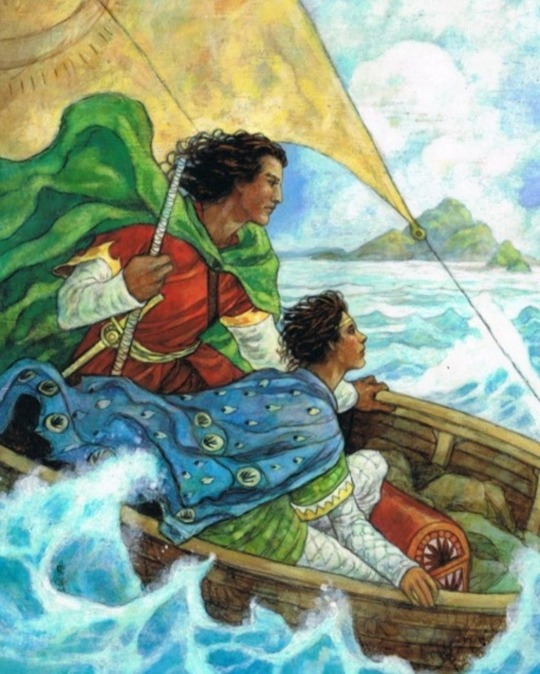
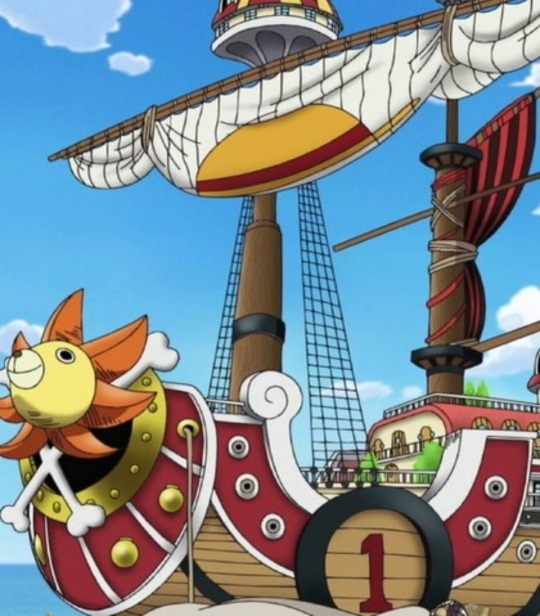
#battle of the ships#tournament polls#semi finals#lookfar#earthsea#a wizard of earthsea#bookblr#ursula le guin#ursula k. le guin#mangablr#animeblr#thousand sunny#one piece#one piece series#one piece manga#one piece anime#one piece tag#one piece fandom
103 notes
·
View notes
Note
ik you use to draw a lot of harry potter...i was wondering what your opinion of it is now?
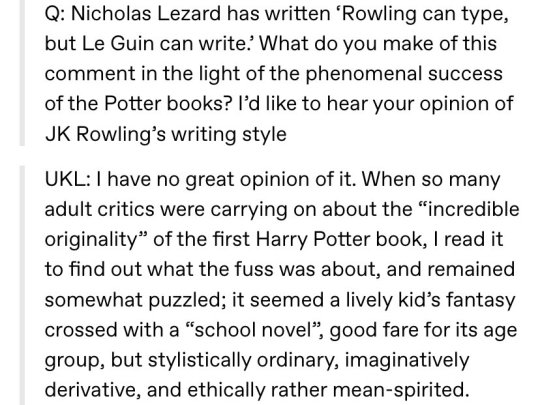
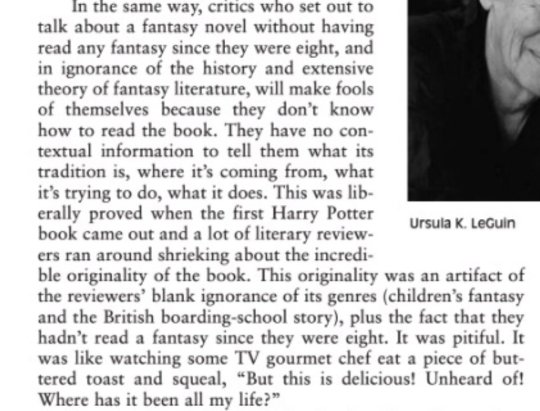
this
#barks#listen. if u wanna read it still that fine! who am i to tell u what u can and cant consume!#u dont hve to only consume Morally Pure media. its fine to read problematic books etc#u just. have 2 acknowledge. they r problematic. and understand how and why they r problematic. and also not shout 2 th rooftops u read#n enjoy said piece of media bc a) it can lead to people who dont understand why that media is problematic to approach it naive n wide-eyed#and b) in the case of hp the creator of th media is sometimes a horrible person. n when i see someone still pubically supporting and#enjoying hp im like. do u not care? abt th things she says? or are u just naive?#either way i want nothing to do with u#yes i loved it as a kid and it was important to me and some part of me will always find it important . but also . there r other books#hp is a childrens fantasy series. there are better ones. as an adult if ur still clinging on to it. let go. read tales of earthsea#and get sm perspective
186 notes
·
View notes
Text
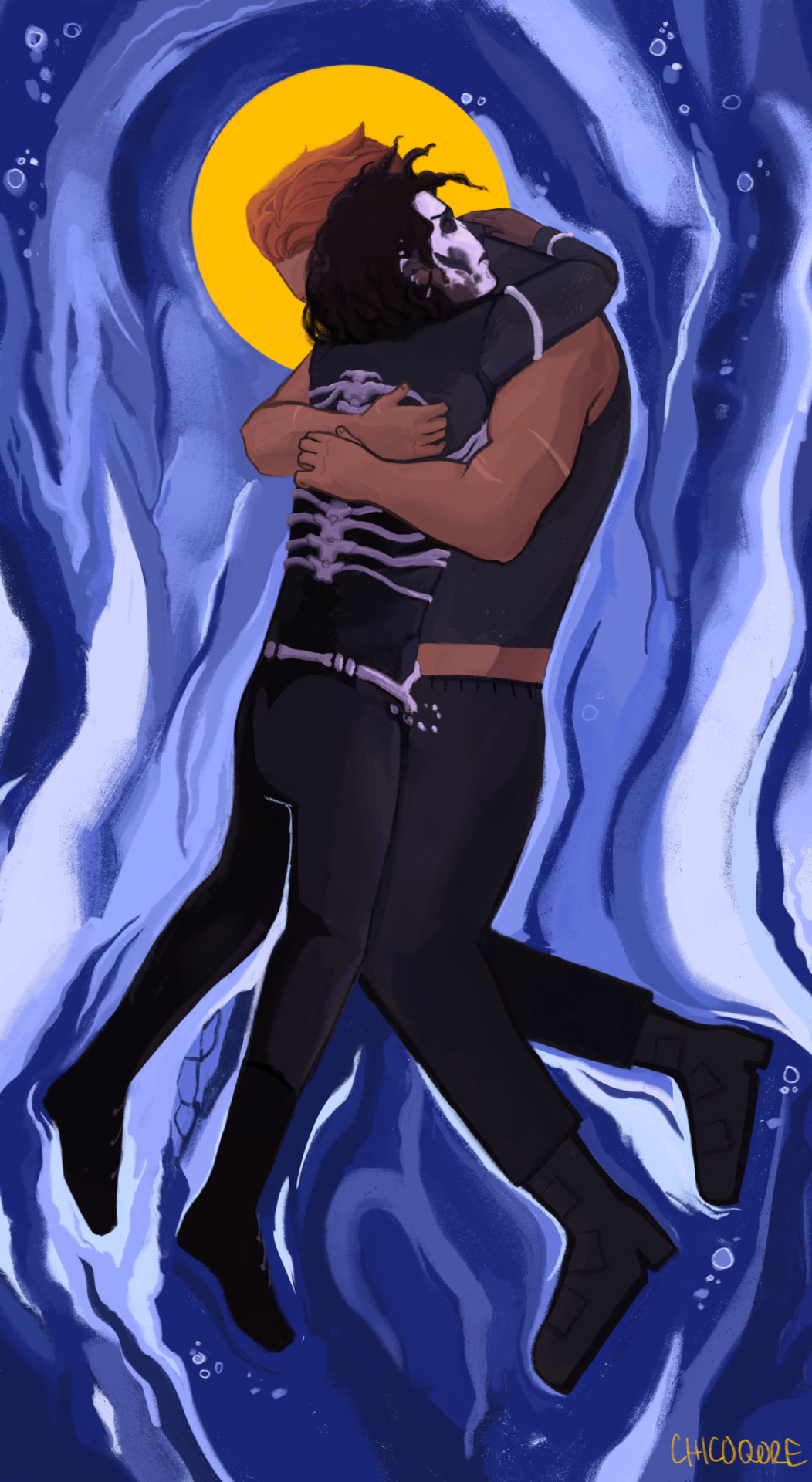
then harrow was drowning in salt water. gideon’s arms were around her.
#the locked tomb#tlt#my art#griddlehark#harrow the ninth#gideon nav#harrowhark nonagesimus#digital art#this series ruined my life! gay people#i actually genuinely loved harrow the ninth and im really excited to get my copy of nona#currently reading earthsea btw#might drop a doodle sheet from when i was reading this series a couple months ago cause i definitely scribbled a lot down#anyways#i love you butch jesus
196 notes
·
View notes
Text
okay wait i need a more thoughtful compilation of the earthsea passages i have saved

1. alwayyys tenar once i meant to kill him now ill make him live if i can which of us saved the other from the labyrinth. always. the farthest shore walked as a heroes journey adventure so that 20 yrs later tehanu could run in the aftermath of the heroes journey from the perspective of the women who had until now been excluded. and her boldness reminds me of when she was arha
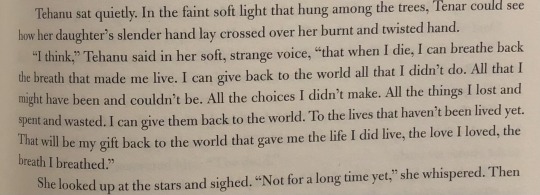
2. tehanus that will be my gift back to the world that gave me the life i did live the love i loved and the breath i breathed. dear dragon girl


3. these two go together. tenars almost immediate love for lebannen like she sees immediately why ged cared abt him she loves him for the same reasons. my son my king my dear boy.
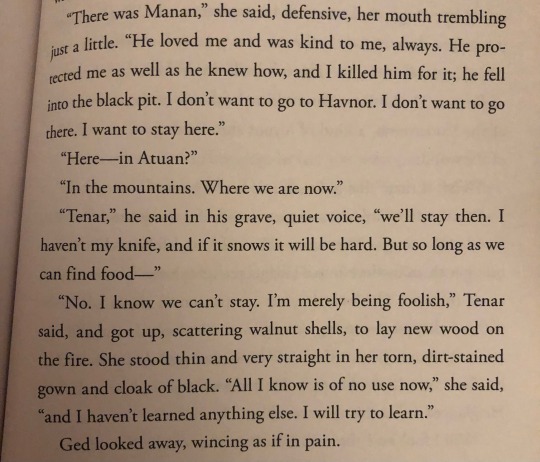
4. ged finds a girl in a cave and she locks him up but they wind up escaping together and in her nervousness about an outside world she was secluded from all her life she says she just wants to live in the mountains and he genuinely is like yes itll be hard but if thats what u want we’ll do it. okay tbh hes probably already in that existential crisis we see in farthest shore and tehanu
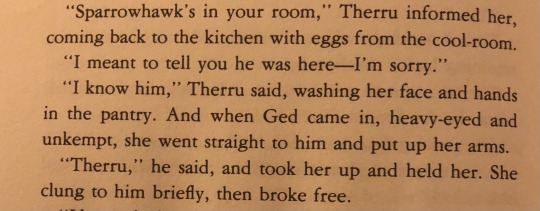
5. this is like the companion to the tenar-with-lebannen passages because now its ged-with-therru (step-parents w the kids the other person adopted LOL) so many of my saved passages r feelings over little therru

bonus um. the i do know you. i do know you. its like this + the whole section after but vetch is so important TO ME. also that fanart of this scene i rbed a while ago. real
#earthsea#can you tell what my favoeite book in the series is. or who nt favorite character is#edit wait had to add the i do know you i do know you#it wasnt until this scene that the wizard of earthsea really had my sold tbh. i wish more of the novel was spent with vetch i miss him
35 notes
·
View notes
Text
Okay, I will say it... It absolutely INFURIATES ME that people say they want to make (or start making) a project about Oz - as in the literary Oz, the original Oz, the Oz books, right?
And then... then they say "Oh yeah I never read any of the books outside of the first one, and I don't intend to. I'll just use Wikipedia articles and various Oz adaptations".
WHAT THE HECK IS WRONG WITH YOU ARE YOU LITERALY SO LAZY? I mean... you do an adaptation of a specific material that was overtly overshadowed and ignored, is surrounded by misinformation and misadaptation, and with more than half of its content not found on stuff like Wikipedia... And you don't even bother reading it to know what you are getting into?
If you want to do something based on the MGM movie, it's fine. If you want to do something based on Wicked, it's fine. If you want to do something based on the friggin' anime series it's fine! But don't start claiming you want to do based something on Baum's original book when you clearly don't want to!
Because you know what the worst offense is?
Not only are Baum's books books for CHILDREN which means they are quick and easy to read... BUT THEY ARE IN PUBLIC DOMAIN! Which means not only you can find copies of them everywhere... THEY ARE ALSO EVERYWHERE ON THE INTERNET! THERE'S TONS OF WEBSITES with ALL of Baum's books available for free to read any time you want, at any speed you want, with no effort to bring!
You have all of this material at your fingertips, ready to grab, and you just... "Nah, I say I will use the Oz books but I only read one and the rest comes from adaptations". GRRGRHRHFTHRAAAAAA
#oz#l. frank baum#oz books#the wizard of oz#you can literaly read a Baum book in like one afternoon if you have nothing else to do#you know like a sunday afternoon#they're short they're simple they're whimsical#reading baum is not like reading tolkien come on#people are so lazy#they don't even realize they are lying not just to the world but to themselves#when you want to adapt something GET TO KNOW THE ORIGINAL MATERIAL FIRST#else you'll end up as worst as these guys that did a mini-series live-action adaptation of Earthsea#come on people#rant of the day
11 notes
·
View notes